Unpack the value of digital-first operations
Digital operations are the intentional use of technology to run and improve a business. By digitizing processes, workflows, and day-to-day activities, organizations streamline work, cut costs, boost efficiency, and unlock new value across functions.
Demo and Features
By integrating these technologies, companies can improve operational agility, optimize resource allocation, and adapt to the rapidly changing digital landscape. This transformation is often part of a broader digital transformation strategy that focuses on improving customer experiences, enhancing internal processes, and fostering innovation.
- Automation Tools
- Cloud Computing
- Data Analytics
- Artificial Intelligence and Machine Learning
- Internet of Things (IoT)
- Robotic Process Automation (RPA)

Benefits of Digital operations
Digital operations leverage modern technologies and tools to optimize business processes and workflows. By integrating digital platforms, organizations can achieve significant advantages across various aspects of their operations. These benefits include:
- Improved efficiency and productivity.
- Enhanced data-driven decision-making.
- Reduced operational costs.
- Better customer experiences.
- Streamlined workflows and automation.
- Real-time monitoring and insights.
- Strengthened data security and compliance.
Digital operations enable organizations across various industries to enhance productivity.
Digital operations involve the strategic use of digital technologies and tools to enhance, streamline, and manage business processes, workflows, and activities. Across different industries, digital operations transform traditional ways of working, providing significant benefits that drive efficiency, improve customer experiences, and reduce costs. Here’s how digital operations impact various sectors:
Manufacturing
- Automation and Robotics: Digital tools automate production lines, reduce manual labor, and minimize errors, leading to higher efficiency.
- Predictive Maintenance: IoT sensors and analytics predict equipment failures, minimizing downtime and maintenance costs.
- Supply Chain Optimization: Digital platforms improve supply chain visibility and inventory management, leading to faster response times and reduced costs.
Retail
- Omnichannel Customer Experience: Digital operations integrate online and offline channels, providing customers with a seamless and personalized shopping experience.
- Inventory Management: Real-time data analytics optimize stock levels, reducing excess inventory and out-of-stock situations.
- Digital Payments and Loyalty Programs: Automated payment systems and digital rewards programs enhance customer engagement and streamline transactions.
Energy and Utilities
- Smart Grid Management: Digital operations support smart grid technology, optimizing energy distribution and improving service reliability.
- Asset Management: Predictive maintenance and real-time monitoring enhance the lifespan of equipment and reduce operational costs.
- Sustainability Initiatives: Digital solutions facilitate the tracking and reporting of energy usage, aiding in the implementation of green practices.
Logistics and Transportation
- Fleet Management: Digital tools monitor vehicle locations, optimize routes, and reduce fuel consumption, enhancing delivery efficiency.
- Supply Chain Visibility: Digital platforms improve the tracking of shipments, ensuring timely delivery and better inventory management.
- Automated Warehousing: Robotics and automated systems increase the speed and accuracy of warehousing operations.
Conclusion
Digital operations enable organizations across various industries to enhance productivity, optimize costs, and improve customer experiences. By adopting digital strategies, companies can transform traditional processes into more agile and efficient systems, staying competitive in an increasingly digital world.
